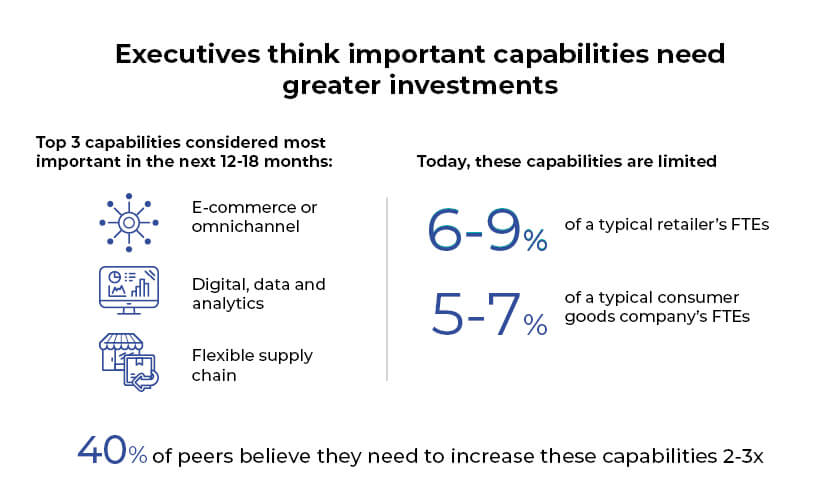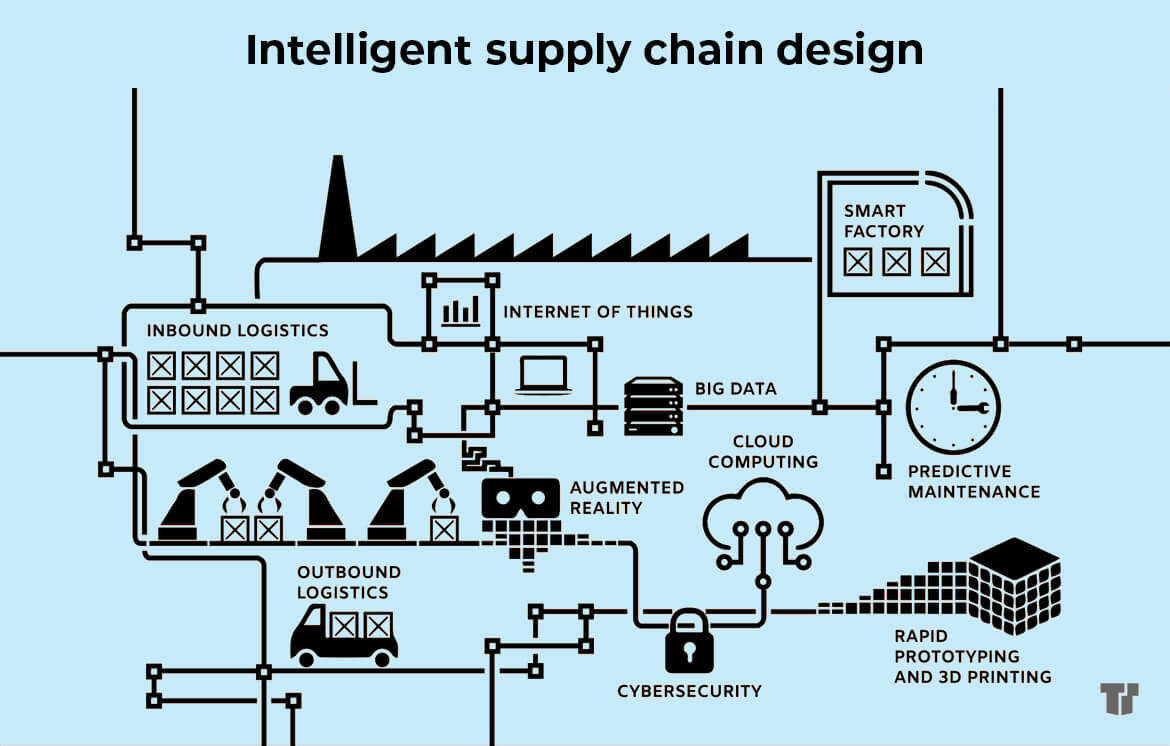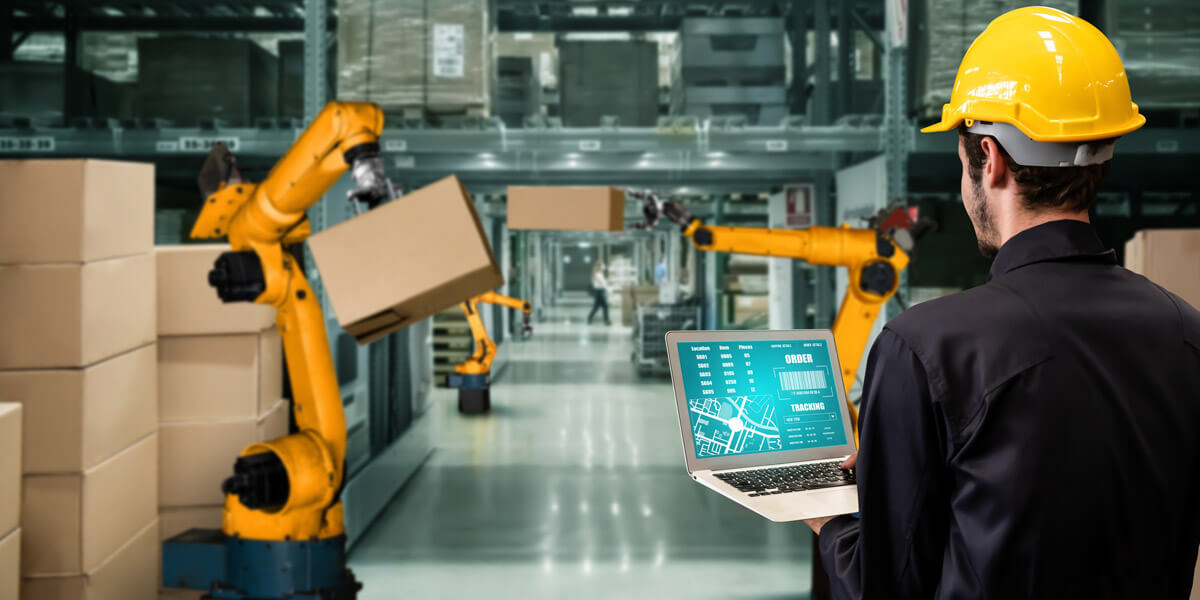It has been anything but easy to keep operations running across sectors during the COVID-19 pandemic. Inconsistencies in demand and supply posed a daunting challenge for retailers, buyers, and suppliers in the CPG and FMCG sectors. In addition, a dramatic shift in consumer buying behavior and increasing stay-at-home tendency put great strain on supply chains. So much so that the supply chain costs for several CPG firms escalated by up to 50%. As a result, industry players have had to rethink their traditional models and reposition themselves for the new reality.
Supply chains play a significant role in responding to an unprecedented crisis with resilience. However, a recent survey of retailers and CPG companies indicates that many feel the need to allocate more than twice the average resources required to increase their supply chain’s flexibility.

How can businesses overcome this challenge? An intelligent supply chain allows for real-time visibility and transparency, resulting in optimum demand planning and greater customer satisfaction.
What is an intelligent supply chain?
An intelligent supply chain leverages the latest technologies and incorporates data-driven insights to facilitate optimal processes. It brings together product, service, and process innovation to deliver on customer preferences. The key features of an intelligent supply chain include:
- Increased process transparency with real-time responses- facilitating collaborative insights and greater stock control
- Incorporating customer feedback to adapt to their needs
- Quickly responding to changing market dynamics with intelligent technologies
- Automating processes for improved inventory turnovers
A recent analysis indicates that large CPG firms developing an intelligent supply chain could grow revenues by up to 3% through improved product availability and enhanced customer service. Plus, they can increase profitability through cost reductions.
By leveraging technologies such as blockchain, IoT, and AI, intelligent supply chains are changing the game for traditional warehouses and retailers. In fact, 61% of consumer products companies intend to increase their supply chain digitization investments to optimize their operations.
For instance, foodservice distribution firm Sysco, built a new supply chain in less than one week to serve grocery stores during the pandemic. Furthermore, they have increased their investments in enhanced supply chain systems to drive a customer-focused, innovative, and growth-oriented business.

Using intelligent supply chains to gain a competitive edge
Last year, consumer dependency on e-commerce channels increased dramatically. The pandemic also gave rise to new consumer expectations such as same or next-day deliveries and personalized shopping experiences. To keep up with the digital-first new normal, CPG supply chains today need to deliver renewed processes – faster prototyping, innovative offerings, and decreased time-to-market of new products.
With 81% of supply chain leaders stating that the pandemic has majorly tested their capabilities, only 4% feel future-ready. A connected, agile, and intelligent supply chain is an important step towards achieving growth and building resilience in the CPG sector.
Here’s how CPG companies can build resilience and gain a competitive advantage by adopting intelligent supply chains:
1. Achieving 360-degree visibility
In the ideal world of a demand-driven supply chain, a product flows from the furthest supplier to the end customer in a smooth, synchronized manner. However, supply chains that often span across multiple enterprises and around the globe require a holistic view of consumer demand, inventories, and shipments. This is easier said than done.
In fact, over 90% of supply chain executives cannot confide in their system capabilities for end-to-end supply chain visibility. This challenge arises because of two major reasons:
- Relevant information including inventory and delivery updates in most companies exists in silos.
- The lack of business process coordination with suppliers results in manually-intensive and inefficient supply and demand management.
The solution:
With an intelligent supply chain in place, companies can increase automation to streamline their collaboration with multiple vendors. They can implement next-generation data capture technologies such as RFID, ultrawideband (UWB), and Bluetooth Low Energy (BLE) beacons for consistent inventory tracking and planning.
Increased visibility allows organizations to rapidly make contingency plans in the event of unforeseen situations, like delayed supplier shipments, and minimize negative impacts on the supply chain. This can eventually lead to improved relationships between suppliers and the CPG firms.
2. Optimizing processes with real-time insights
In the present day, a CPG supply chain is no longer just a linear flow of goods and services but a highly interconnected network of several suppliers that depend on timely, actionable insights. To add to that, unpredictable environments and rising consumer demands require high efficiency to react to changing network conditions.
For instance, vendor violations of environmental, health, and safety (EHS) regulations can result in tremendous financial and reputational damage by exposing your company to third-party risk. How can your company optimize networks in real-time and mitigate risks through due diligence?
The solution:
Industry 4.0 technologies are creating new opportunities to digitalize the value chain and push dynamic decision-making. Within intelligent supply chains, integrated information garnered from analytics and digital data threads can help monitor every transaction across the network.
By regularly measuring vendor performance using cognitive technologies such as AI and ML, and data analytics, CPG firms can identify the most effective vendors and shed light on fulfillment gaps, if any. The real-time insights can therefore reduce major supply chain risks.
IoT (e.g., connected transportation, cargo, and warehouses) and external data sources (e.g., weather, events, and the traffic flow) enable the digitalization of shipping processes. Moreover, timely alerts on package movements along every step from shipment to delivery can identify delays, can help CPG firms and suppliers to intervene in time, and increase the speed of delivery.
3. AI-enabled cost reduction
Often, supply chain costs account for a substantial percentage of a company’s sales. CPG firms need to consider three key areas for cost savings – transaction costs, supply processes, and demand uncertainty. However, given the complex, multi-faceted nature of today’s supply chains, the costs cannot necessarily be reduced in isolation.
For instance, as consumers increasingly prioritize wellness and sustainability, CPG companies face the challenge of adopting sustainable products, packaging, and processes to win their customer’s trust and loyalty. How can they enhance customer experiences and reduce costs linked with necessary innovation at the same time?
The solution:
AI-enabled intelligent supply chains monitor the full scope of organizational processes and evaluate the direct cost associated with each process. This helps companies to strategically address the three areas of cost savings:
- With optimized workflows, CPG companies can issue and manage invoices, organize deliveries, respond to customer queries and check progress to reduce transaction costs.
- By implementing collaborative planning, forecasting, and replenishment (CPFR) between manufacturers and retailers, companies can further eliminate duplication and multiple iterations in supply processes to significantly bring down the network cost and improve profitability.
- Intelligent supply chains can optimally track and incorporate changing consumer behavior and demand to avoid the ‘just in case’ inventory stockpiling scenario.
Netscribes used analytics-led inventory planning to help a grocery supermarket chain save USD 1.8 million annually. Read here.
Artificial intelligence also shows significant supply chain promise in the process of eliminating wasteful bottlenecks which can help reduce operational costs. This allows CPG companies to focus on automated, sustainable, and efficient supply chain operations.
4. Enabling informed forecasting with predictive analytics
Achieving the right inventory balance requires unique forecasts. However, rapid changes in customer demand make accurate forecasting one of the biggest challenges in supply chain management. Accenture estimates that inaccurate forecasts result in 30-50% excess inventory.
Stock shortages adversely affect customers’ shopping experiences and may even deter them from making future purchases. How can companies timely evolve their supply chains without losing on growth opportunities and stay ahead of the competition?
The solution:
With the onset of COVID-19, suppliers and retailers have had to abandon their bias, pursue new data sets for forecast models, and continually refine their results for the greatest accuracy. An intelligent supply chain employs predictive analytics that can help CPG firms accurately forecast consumer demands and thus optimize their inventories in real-time.
Companies can identify patterns and anomalies in the supply chain, business processes, and distribution network with the use of predictive analytics. They can develop effective action plans that deliver measurable success across their supply network and bring down the time taken to respond to volatile demand and supply. This can, in turn, maximize CPG resilience.
Alibaba’s Xunxi digital factory is a pioneering example to illustrate this benefit of intelligent supply chains. The facility utilizes cloud computing infrastructure and IoT technology to achieve customized and demand-driven production. Informed by real-time market trends and consumer insights, the company employs a made-to-sell approach over the traditional made-to-stock approach. This significantly reduced delivery time by 75%, the need to hold inventory by 30%, and water consumption by 50%.
In conclusion
CPG firms need to consistently analyze, evaluate, and review their supply chain operations to close loopholes and improve business. Moving ahead, agile, sustainable and intelligent supply chains will be a driving force for resilient CPG operations.
In the highly competitive and dynamic consumer goods industry, companies must continually keep up with changing trends and consumer behavior. At Netscribes, we deliver reliable and actionable insights across markets, consumers, competitors, and technologies to help forward-thinking companies make informed decisions. To know more about how we can help your enterprise stay ahead of the curve, contact us today.






